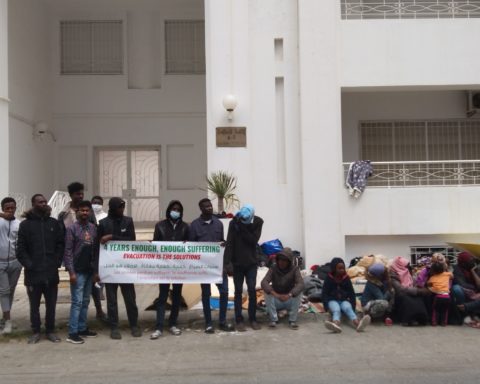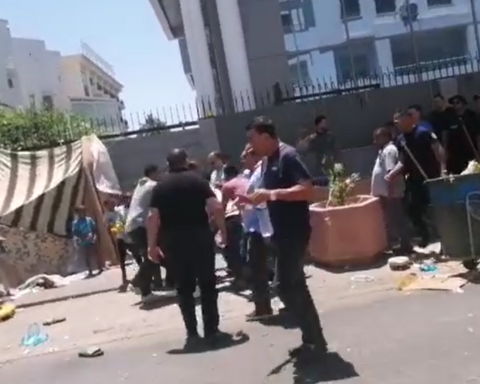
With two vans, we pick up the refugees from Casa Don Gallo, one of the occupied building in Padua, and the asylum seekers hosted by the association Cooperativa Percorso Vita.
They are 20 young boys who have participated in the project “Welcome to Sherwood”. This project is part of the Sherwood Festival and aims at training and integrating these people. The main activities of the project have included: one course for pizza maker and one for phonic technician, activities of night cleaning and parking. They also take Italian language classes twice a week in the morning. In one van we bring a tank of water, our friends in Mira told us it could help local people. We distribute gloves, shovels and festival t-shirts. We are approximately sixty people, including activists from North-East social centres, volunteers and migrants.
We have seen the pictures taken after the tornado on TV and watched phone videos posted on the social media. Unfortunately, only once arrived, we realize the situation is more serious than expected.

We have an appointment at the municipality of Mira in order to prove our identity. It takes time. There are also many citizens, mainly young people, who want to help locals.
Local people instruct us on what to do and we are divided in two groups.
The Civil Protection and the Police Force check the affected area. Only volunteers, residents and trucks removing debris are allowed to access the area. We walk some kilometres, it’s really hot, we all walk in line to make easier the transition of the trucks.
After twenty minutes we are able to reach the area. The first house we find is completely destroyed, but we are surprised to see the building beside is totally intact. Starting from this building, what we see looks very similar to a scenario of war, as devastated by bombing.
We realize there are two cars in the water of the Brenta river. In front of us, on the other side of the river, there is Villa Fini, an historical Veneto villa. Villa Fini has become the symbol of the devastation that has compromised the beauty of this area of the Veneto region.

Ten of us reach a two-floor house, the upper floor has collapsed. Francesco welcomes us and tells what it happened. “My mum and my brother survived by miracle”, he says, “my mum is very old and my brother is disabled, he used to play in the verandah”. The verandah is now crushed. We have to remove all debris to pull out the furniture and everything still usable, in case of a collapse of the entire building.
Francesco shows us the sign of the tornado vortex has left on the gravel surrounding the house. “When we saw it, we immediately thought: they are dead”, he says. He offers us some water and fresh drinks, the sun is really strong.
The other group is bigger, we have to intervene on the factory of a friend’s father. They used to sell windows. The factory’s building is old and very big and its garden is covered by branches, tree trunks and all kind of things which have been hurled by the wind.

Some people of our group start clearing the garden. We drag the tree rests on the river’s side, with the chainsaw all trees are cut. The garden is clear after two hours.
Other people are on the roof and remove shingles, we clear the rubble. All the possible manual work is done, now the trucks have to continue.
The African boys are tireless, the festival t-shirts are sweat-soaked.
The owner of the factory joins our group and offers us some sandwiches and pizza, another lady cooked for us some cold rice. They thank us for what we are doing. “We wouldn’t have done it alone”, they say. We eat all together sitting on the floor, in the only shady place. We say goodbye because we have to reach another area very affected.

On our way back to the festival in the van, Eliot Awogho tells us his story. He is hosted in one of houses managed by Cooperativa Percorso Vita.
“I came to Italy five months ago by boat. I arrived in Sicily, but I don’t know where exactly. Then I went to Messina, where I remained for three months.
I’m 25 years old, I had been studying education and political sciences for five years and I used to live in Abuja, with my uncle. On 14th April 2014 there was a Boko Haram’s attack that caused 71 deaths and 124 injuries. My uncle was one of the 71 killed people. I had no place to stay, I was very confused, my relatives came back to our village, and I didn’t hear anything from them for one week. There was no work, I was afraid of Boko Haram. I went to Agadez, in Niger, where I found the lorry to get to Libya. I payed 500 dollars for this journey. I crossed the desert in a lorry with a lot of people. While travelling, three people fell down but the driver didn’t stop. The other people were from Ghana, Mali, and Cameroon. We ate biscuits, peanuts and gari. We drunk water from big tanks. We spent 12 days under these conditions. During the day it was very hot and during the night it was very cold. We arrived to Sabha, in Libya. I worked for more than one month, sometimes they payed me, sometimes not. The last time I went to ask my salary they said to not come anymore. I left for Tripoli in a Toyota with other 25 people. It took us one week. I had no money and a place to stay neither. I have been working in a building site for 5 months and I slept under the stars, until I decided to take the boat. We crossed the sea in three days, we were around 100 people on the boat.
Now I’m here in Padua, I’m free, Boko Haram is not here.
For me today was a great experience, I’m happy to have participated, I helped some people who lost everything, exactly like me”.
Altri articoli consigliati:
– Sovvertire la “nuova normalità” meteorologica di Chiara Spadaro, Global Project del 9 luglio 2015
– Dopo il tornado. 08072015 di Giacomo Cosua, italy.positive-magazine.com
– Tromba d’aria Venezia, i migranti in strada ad aiutare Dolo e Mira: “Noi sappiamo cosa vuol dire perdere tutto” di Alice D’Este, Il Fatto quotidiano del 12 luglio 2015
– Da Padova 20 rifugiati al lavoro in Riviera di Alberta Pierobon, Il Mattino di Padova 11 luglio 2015
Video a cura di Global Project:




























